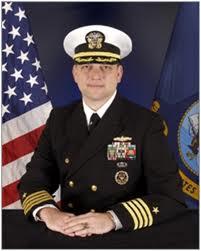U.S. Navy Captain Leads Discussion on National Security at Columbia Law School
New York, March 7, 2014—The global economy, disease, and world hunger are among the greatest threats to U.S. national security, U.S. Navy Captain William J. Parker III told a group of students from Columbia Law School and the Columbia School of International and Public Affairs (SIPA) in a March 4 talk.
| U.S. Navy Captain William J. Parker III |
Parker’s appearance was organized by the National Security Law Society and LGBT groups from both schools—the Law School’s Outlaws, and the SIPA Spectrum. He devoted part of his well-received discussion to the repeal of the military’s “don’t ask, don’t tell” policy, which had previously prohibited gays and lesbians from serving openly in the military, saying the repeal produced no discernible changes in the Navy.
But Parker, a military fellow at the Council on Foreign Relations and 1988 distinguished graduate and class president of the U.S. Air Force Academy, spoke mostly about current national security threats and inter-agency coordination between the military and other federal departments.
“I think the number one threat to our national security is the world economy,” said Parker, a highly decorated combat veteran. “Our country’s economic strength dictates how we will be able to apply the appropriate level of resources to national security efforts.”
Parker said it is better to negotiate from a dual position of military and economic strength.
“The United States has much talent, many resources, and a strong history of a productive middle class,” he added. “As I look around the world, those nations which are most unstable are plagued with a shrinking or virtually no middle class. ”
Parker most recently commanded Destroyer Squadron Two Three. He is an award-winning author who holds a Ph.D. in biological defense from George Mason University's department of molecular and microbiology and an M.A. from Harvard University's John F. Kennedy School of Government. Parker is the Navy's 2009 recipient of the James Stockdale Award for Inspirational Leadership. He has served nearly two years on the ground in Iraq, Afghanistan, and Pakistan, as the senior military adviser to the Secretary of State for Iraq, as the senior adviser to the U.S. Ambassador to Pakistan, and in various joint and navy staff strategic planning positions.
At the March 4 event, Parker also addressed the current standoff with Russia in Ukraine, facilitating discussion among students in an impromptu role-play.
“You’re the president of the United States,” he said to one attendee. “You woke up this morning and there are 16,000 Russian troops in Ukraine and 150,000 more conducting exercises nearby.”
He pointed to other students, drawing them into the conversation as intelligence officers and the secretary of defense.
“Pull your national security team together and let’s go to work to deal with this issue considering the instruments of national power we just discussed.”
